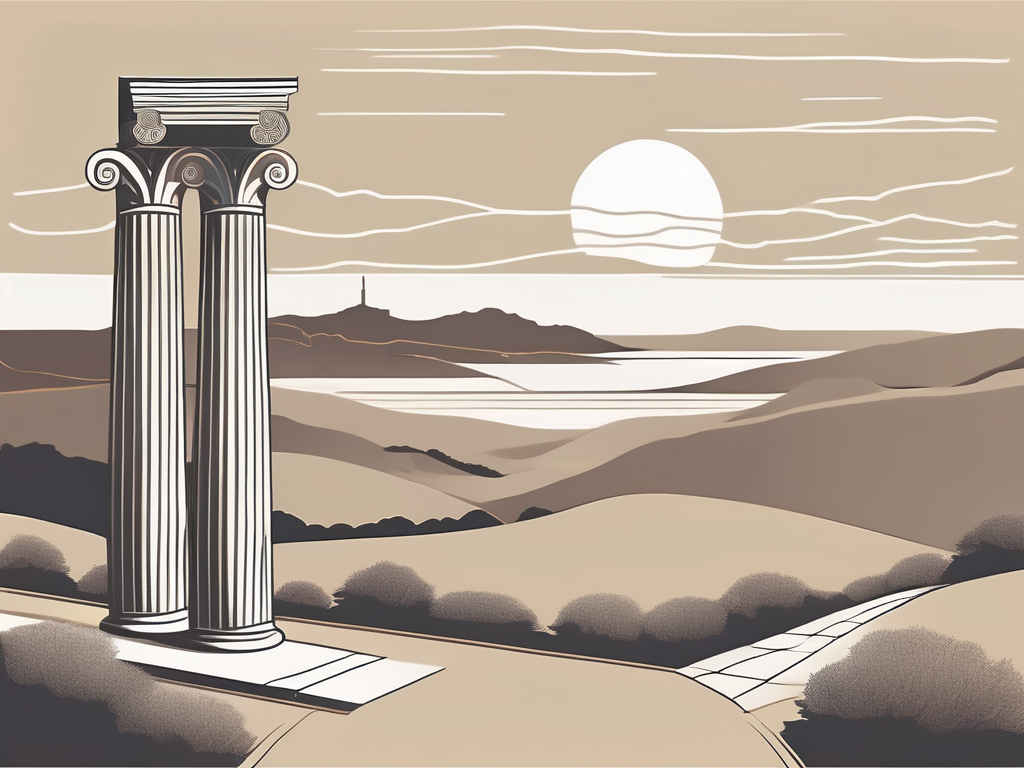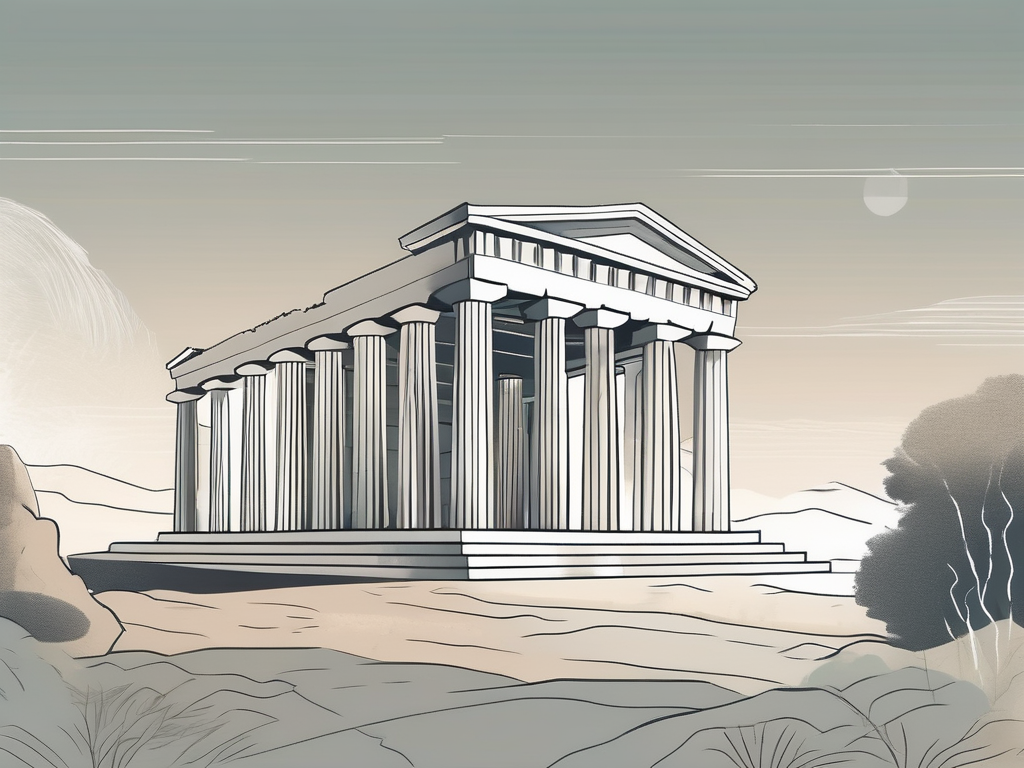Death is a natural part of life, an eventuality that awaits us all. While many may find the idea of death unsettling, the Stoics took a different approach. Stoicism, a philosophy that originated in ancient Greece, offers a unique perspective on death—one that encourages us to embrace life’s inevitable end.
Understanding Stoicism: A Brief Overview
Before delving into the Stoic perspective on death, let’s first explore the core principles of Stoicism. At its essence, Stoicism teaches the importance of virtue, tranquility of mind, and acceptance of the things we cannot control. It encourages individuals to live in accordance with nature and to find happiness within themselves rather than relying on external circumstances.
Stoics believe that by accepting the transitory nature of life and recognizing our own mortality, we can cultivate a sense of inner peace and live with greater purpose. This viewpoint shapes their thoughts on death as well.
The Core Principles of Stoicism
The Stoics hold several key principles that form the foundation of their philosophy. These principles include:
- Living in accordance with nature and the universal order
- Cultivating virtues such as wisdom, justice, courage, and temperance
- Focusing on what is within our control and accepting what is not
- Developing resilience and emotional strength
By adhering to these principles and embracing the inevitability of death, Stoics believe we can lead a more fulfilling and meaningful life.
Stoicism and the Concept of Death
For the Stoics, death was not to be feared but embraced as a natural part of the human experience. They believed that by accepting our mortality, we can better appreciate the limited time we have and make the most of it. Unlike other ancient philosophies that viewed death as an end, Stoicism offered a different perspective.
In the Stoic view, death is not the ultimate tragedy. Rather, it is a reminder of the impermanence of life and the need to make the most of every moment. By acknowledging that death is beyond our control, Stoicism encourages us to focus on the present and live virtuously.
Furthermore, Stoics believe that death provides an opportunity for reflection and self-examination. It prompts individuals to contemplate the legacy they will leave behind and the impact they have had on the world. This reflection can inspire individuals to live a life of purpose and strive to make a positive difference in the lives of others.
Additionally, Stoicism teaches that death is not the end of consciousness but a transition to a different state. Stoics believe in the existence of a universal soul or cosmic intelligence, which continues to exist after death. This belief provides comfort and reassurance, as it suggests that our individual existence is part of a larger cosmic order.
Stoics also emphasize the importance of preparing for death throughout one’s life. They encourage individuals to contemplate their own mortality regularly and to live each day as if it were their last. This practice serves as a reminder to prioritize what truly matters and to avoid becoming consumed by trivial concerns.
Furthermore, Stoics believe that by embracing death as a natural part of life, we can overcome the fear and anxiety often associated with it. This allows individuals to approach death with a sense of calm and acceptance, enabling them to face the end of their own lives or the loss of loved ones with greater equanimity.
In conclusion, Stoicism offers a unique perspective on death. By accepting our mortality and embracing death as a natural part of the human experience, Stoics believe we can live more fulfilling lives and find inner peace. Through their core principles and teachings, Stoicism provides a framework for navigating the complexities of life and death with wisdom and resilience.
The Stoic Approach to Life and Death
Now that we understand the Stoic perspective, let’s explore how it applies to both life and death.
The Stoic philosophy offers a unique perspective on mortality, urging individuals to embrace the reality of their own finitude. Stoics believe that by embracing our mortality, we can live more fully. Instead of fearing death, it encourages us to see it as a motivation to make the most of our time. By recognizing the fragility and transience of life, we can prioritize what truly matters and strive to live virtuously.
This perspective reminds us to focus on the present moment, to appreciate the beauty around us, and to cultivate meaningful connections with others. By acknowledging our mortality, we become more aware of the preciousness of life, making each moment count.
Furthermore, the Stoic approach to death encourages individuals to contemplate the impermanence of all things. This contemplation serves as a reminder that life is fleeting and that our time on Earth is limited. It prompts us to reflect on the legacy we wish to leave behind and the impact we want to have on the world.
Embracing Mortality: A Stoic’s View
Stoicism teaches us that embracing our mortality is not an act of resignation or defeat, but rather an empowering recognition of our own humanity. By acknowledging the inevitability of death, we can confront our fears and anxieties head-on, allowing us to lead lives of greater purpose and fulfillment.
Moreover, the Stoic perspective on mortality encourages individuals to live in alignment with their values and principles. It inspires us to prioritize what truly matters, to let go of trivial concerns, and to focus on the pursuit of virtue. By accepting the reality of death, Stoics believe that we can live with greater intention and authenticity.
By embracing mortality, Stoics also cultivate a deep sense of gratitude for the time they have been given. Each day becomes a precious gift, an opportunity to make a positive impact on the world and to leave a lasting legacy. This mindset fosters a profound appreciation for life’s fleeting moments, encouraging individuals to savor the present and to cherish the relationships and experiences that enrich their existence.
The Role of Acceptance in Stoicism
Acceptance is a fundamental aspect of Stoicism. Stoics believe that it is not external events or circumstances that cause us suffering, but rather our judgments and attachments to them. In the face of death, Stoicism teaches us to accept its inevitability and let go of our fear and resistance.
By accepting death, we can find peace and tranquility in our own mortality. This acceptance allows us to focus on living a virtuous life rather than being consumed by anxiety or worry about the end that awaits us.
Furthermore, the Stoic philosophy encourages individuals to embrace the concept of memento mori, a Latin phrase meaning “remember that you must die.” This practice involves regularly contemplating the reality of death as a means of cultivating gratitude, humility, and a sense of urgency in our daily lives.
Through the practice of acceptance, Stoics aim to develop resilience and inner strength. By acknowledging the impermanence of life, they become less attached to external outcomes and more focused on cultivating their own character and virtue.
In conclusion, the Stoic approach to life and death offers valuable insights into how we can navigate the inevitable challenges and uncertainties of our existence. By embracing our mortality and practicing acceptance, we can live with greater purpose, gratitude, and inner peace. Stoicism reminds us that death is not something to be feared, but rather a reminder to live fully and virtuously in the present moment.
The Stoic’s Guide to Coping with Death
Although the Stoics advocated for embracing death, they also recognized the challenges posed by the loss of loved ones. Stoicism offers strategies for coping with grief and navigating the mourning process.
When faced with the death of a loved one, the Stoics advised turning to their core principles for guidance. By practicing acceptance and recognizing that death is beyond our control, we can find solace and strength in the face of grief.
Stoicism also emphasizes the importance of gratitude and focusing on the memories and lessons left behind by the departed. By cherishing the time we had with them and carrying their legacy forward, we can find meaning in their passing.
Furthermore, Stoicism encourages us to reflect on the transient nature of life and the inevitability of death. This perspective reminds us to cherish every moment we have with our loved ones and to make the most of our time together.
Moreover, Stoicism teaches us to find comfort in the interconnectedness of all things. While the loss of a loved one may feel isolating, Stoicism reminds us that we are part of a larger whole. We can find solace in the knowledge that our loved one’s energy lives on in the universe, and that their impact continues to ripple through the lives they touched.
The Power of Perspective: Stoicism and Grief
Stoicism teaches us to change our perspective on grief and loss. Rather than viewing it as a tragedy to be overcome, Stoicism encourages us to see it as an opportunity for growth and transformation.
By embracing our grief and allowing ourselves to experience the full range of emotions, we can learn valuable lessons about the fragility of life and the depth of our own resilience. Stoicism teaches us to find strength in our vulnerability and to use our grief as a catalyst for personal growth.
Moreover, Stoicism reminds us that death is a natural part of the human experience. It encourages us to confront our mortality and to live each day with intention and purpose. By acknowledging the inevitability of death, we can cultivate a deeper appreciation for life and make the most of the time we have.
Additionally, Stoicism emphasizes the importance of self-reflection and introspection in times of grief. It encourages us to examine our own beliefs and values, and to use the experience of loss as an opportunity for self-discovery and personal development.
Furthermore, Stoicism teaches us to find solace in the interconnectedness of all things. Just as we are connected to our loved ones in life, we remain connected to them in death. Their presence lives on in our memories, in the lessons they taught us, and in the impact they had on our lives.
Applying Stoic Principles to Everyday Life
Stoicism is not limited to our attitudes towards death and loss. It offers valuable guidance for living a more fulfilling and meaningful life each day.
Stoicism, an ancient philosophy that originated in Greece, has gained renewed interest and popularity in recent years. Its principles have proven to be timeless and applicable to modern life. By adopting Stoic principles, individuals can find a sense of purpose, resilience, and contentment in their everyday lives.
Living Fully: The Stoic Embrace of Life’s Transience
Stoicism encourages us to fully embrace the present moment and appreciate the fleeting nature of life. By recognizing that everything is impermanent, we can cultivate a deep sense of gratitude and savor each experience.
Imagine waking up each morning and taking a moment to acknowledge the impermanence of life. This simple act can shift our perspective and remind us to make the most of each day. Whether it’s enjoying a cup of coffee, going for a walk in nature, or spending quality time with loved ones, Stoicism teaches us to find joy in the present moment.
This perspective allows us to let go of unnecessary attachments and appreciate the beauty of the present moment. Stoicism teaches us to live intentionally and fully, making the most of the time we have.
The Practice of Stoicism in Modern Times
Despite its ancient origins, Stoicism remains relevant in today’s fast-paced and uncertain world. Many individuals find solace in its timeless wisdom and practical approach to life.
Modern applications of Stoicism include practices such as meditation, journaling, and mindfulness. By incorporating Stoic principles into our daily lives, we can cultivate resilience, find contentment, and navigate the challenges that come our way.
Imagine starting your day with a few minutes of meditation, focusing on the present moment and acknowledging your thoughts and emotions without judgment. This practice can help cultivate a sense of inner calm and clarity, allowing you to approach the day with a stoic mindset.
Journaling is another powerful tool that can be used to apply Stoic principles. By reflecting on your thoughts and experiences, you can gain insight into your own patterns of thinking and behavior. This self-awareness can help you identify areas for growth and develop a more stoic perspective.
Furthermore, practicing mindfulness throughout the day can help you stay present and fully engaged in each moment. By bringing your attention to the present moment, you can cultivate a sense of gratitude and appreciation for the simple joys of life.
In conclusion, Stoicism offers practical guidance for living a more fulfilling and meaningful life. By embracing the transience of life and incorporating Stoic principles into our daily routines, we can cultivate resilience, find contentment, and navigate the challenges that come our way. So why not give Stoicism a try and see how it can positively impact your life?
The Impact of Stoic Philosophy on Modern Thought
Stoicism continues to influence various areas of modern thought, including psychology and personal development.
Stoicism and Contemporary Psychology
The principles of Stoicism align closely with many concepts in contemporary psychology, such as cognitive-behavioral therapy (CBT) and mindfulness-based approaches. These therapeutic modalities draw upon Stoic teachings to help individuals manage stress, develop resilience, and find greater satisfaction in life.
The Enduring Relevance of Stoic Philosophy
Stoic philosophy has stood the test of time due to its inherent wisdom and universal applicability. Its emphasis on cultivating inner strength, practicing acceptance, and embracing the inevitable can provide guidance and solace to individuals navigating the complexities of modern life.
By embracing the Stoic perspective on death and life’s transience, we can find a deeper appreciation for the present moment, cultivate resilience in the face of challenges, and ultimately live a more fulfilling and meaningful life.












